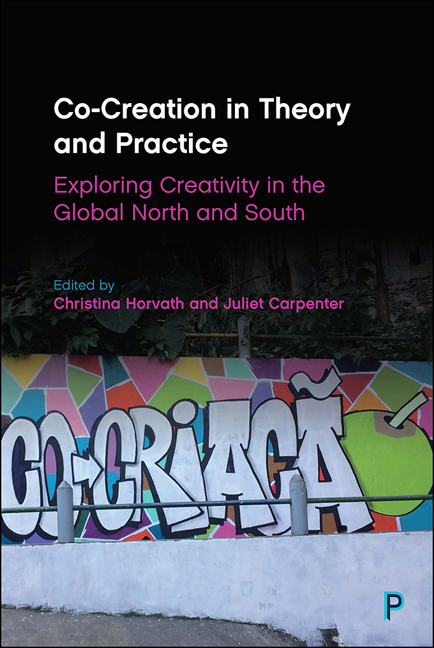16 - Artist-researcher Collaborations in Co-Creation: Redesigning Favela Tourism Around Graffiti
Published online by Cambridge University Press: 18 March 2021
Summary
Introduction
As the previous chapters have demonstrated, each Co-Creation experience is unique. Project outcomes and dynamics vary greatly from one project to the other depending on their origins, length, the actors who initiated them and the interactions between the originators and other participants. Workshops can be instigated by academics with expertise in research design, by artists familiar with creative techniques or local actors knowledgeable about issues relevant to the community. Roles are, however, rarely clear-cut and several combinations are possible, including those of artist-researchers, community researchers or community artists.
This chapter explores an artist-driven Co-Creation experience initiated by a graffiti artist from the Global South who is also an activist embedded in a local community. This bottom-up, organic Co-Creation experience was supported by a group of researchers from a Global North university and the analysis presented in this chapter has been produced collaboratively by the artist and one of the researchers. This close collaboration between artist and researchers and Global South and Global North participants presented the two authors with multiple opportunities to observe how trust-based relationships are developed between participants of different backgrounds and to reflect on the role of the artist as the project initiator, as well as on the researchers’ contribution to both the creative process and the knowledge production.
The initiative took place in the Rio de Janeiro favela of Tabajaras & Cabritos in July– August 2019. It was designed by graffiti artist Leandro Rodrigues – aka Tick – in collaboration with four social science researchers from the University of Bath and a group of local residents and stakeholders. Its aim was to establish a new walking tour focusing on street art in and around Tabajaras & Cabritos by extending a previous favela tour, which had been discontinued in 2017 due to the increase of violence in the neighbourhood. Including larger sections of the surrounding areas of Copacabana, Bairro Peixoto and Botafogo was seen by Tick as a potential way to make the tour sustainable, as it would allow guides to avoid areas of risk on days of armed conflict in the favela. The redesign also gave the opportunity to shift from the tour's previous focus on favela lifestyle, local history and political resistance to a new narrative about creativity, socially engaged street art and collaboration between artists and communities living on the margin.
- Type
- Chapter
- Information
- Co-Creation in Theory and PracticeExploring Creativity in the Global North and South, pp. 253 - 270Publisher: Bristol University PressPrint publication year: 2020

